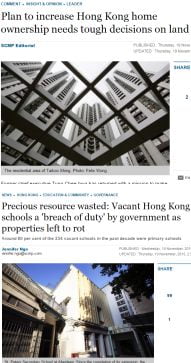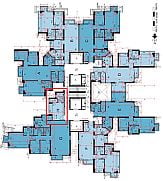A South China Morning Post editorial agonizes over Hong Kong’s housing crisis – a predicament now entering its 147th year. The writer refers to the Our HK Foundation’s proposal for sales of public housing as ‘thinking out of the box’, when it is trivial in scale and looks more like sugar-coating for development of country parks. And the conclusion is… reclamation, blah blah, green belt, blah blah, conundrum, tough decisions, blah blah.  This is simply the government’s official line: we’d love to have affordable and decent housing, but the overwhelming problem of land scarcity is totally beyond the control of mankind, unfortunately.
This is simply the government’s official line: we’d love to have affordable and decent housing, but the overwhelming problem of land scarcity is totally beyond the control of mankind, unfortunately.
Meanwhile, the paper reports the government auditor’s finding that around 100 schools, many in urban areas, are sitting empty and rotting. And over in the Legislative Council, the Development Secretary half-admits that the ‘small house policy’ for non-existent farmers’ sons, is a ludicrous waste of land, but sees no way out of it. (An interesting story on that rip-off here.) We can all think of ways that Hong Kong keeps land scarce and homes expensive. Developers are free to focus on building investment assets for overseas money-launderers rather than homes for local people. The government land system perversely requires prohibitive upfront payments before anyone can use brownfield sites and industrial zones for housing. Planners allocate more space to oversized road networks than to residential use. There’s five targets for ‘out of the box thinking’ in one paragraph.
Just a little more mental effort reveals further expanses of space just waiting to be freed up. The site occupied uselessly by Disneyland could hold a small city. The parasitical tourism industry grabs yet more space everywhere: in my neighbourhood, three hotels are going up on previously residential lots, and then there’s the vast, empty cruise terminal at Kai Tak. Kill off another sunset ‘pillar industry’ by relocating the container port in the Mainland, and you have another small city or two.
Serious ‘thinking out of the box’ opens up a world of new possibilities. Building codes  based on bygone ventilation/public-health concerns could be relaxed, enabling significantly bigger apartments. You could move malls, sports centres and other facilities underground (the HK-Guangzhou high-speed Mega-Hole would do) or onto platforms above sprawling highway intersections. If our paranoid Communist friends in Beijing could be convinced that a happier Hong Kong would be calmer and more loyal, we could think about slowing Mainland immigration, which these days seems to be more about demographic dilution than family reunion. Or, with the right transport and other infrastructure, we could establish settlements of retirees or telecommuters in offshore enclaves (Shenzhen’s latest lifeless free-trade zone hub, for example).
based on bygone ventilation/public-health concerns could be relaxed, enabling significantly bigger apartments. You could move malls, sports centres and other facilities underground (the HK-Guangzhou high-speed Mega-Hole would do) or onto platforms above sprawling highway intersections. If our paranoid Communist friends in Beijing could be convinced that a happier Hong Kong would be calmer and more loyal, we could think about slowing Mainland immigration, which these days seems to be more about demographic dilution than family reunion. Or, with the right transport and other infrastructure, we could establish settlements of retirees or telecommuters in offshore enclaves (Shenzhen’s latest lifeless free-trade zone hub, for example).
But of course this assumes that our policymakers see affordable homes – which means additional spending power remaining in the middle class’s pockets – as desirable. If, on the other hand, the idea is to enable a few landed interests to continue effortlessly extracting maximum disposable wealth from the economically productive population, the ‘shortage of land’ must continue.

One of your finest posts. HK simply isn’t run for the benefit of the people of HK and I’m afraid never will be. Meanwhile, those who created the situation behave as if it’s an accident, due to uncontrollable forces of nature about which nothing can be done.
“The site occupied uselessly by Disneyland could hold a small city.” and “Planners allocate more space to oversized road networks than to residential use.”
Both points neatly illustrated by the highway to Disneyland – 10 or so lanes of adjacent roadway with very little traffic.
Or you could simply enforce existing, clearly stated, policy on “small” houses, for instance the banning of building on country park land; in beauty spots; when the owner already owns at least one property/lives abroad/lives in public housing; or when he plans to resell.
Lots of buildings already. They’re called shops. Full of useless crap mainly. But that’s what HK people want isn’t it: a full wallet on top of a crowded festering dung heap where the turds are taken for gold nuggets. All the theorizing about land supply is mush. Put another record on please.
The “small house” policy (if you can call such a shambles a policy) is a complete disgrace. Based on the premise that, usually non-existent, “indigenous villagers” are entitled, free gratis, to a piece of land which they can then use in order to turn themselves into instant millionaires, this squalid piece of jiggery-pokery gives the green light to illegal activity of every stripe.
The “policy” has made a major contribution to the despoilation of the New Territories and serves no other purpose than to enrich the mafiosi of the Heung Yee Kuk, and to strengthen their baleful stranglehold on rural life. With the sole exception of the Hong Kong “civil service”, it is the worst legacy of British colonial rule. Dennis Bray, widely regarded as its progenitor, should be burnt in effigy.
“Demographic dilution”… Wow, HKers on par with Uighurs and Tibetans! What’s next…Han CCPers shouting out slogans like “Be thankful for all the great opportunities were throwing at you…”???
“Demographic dilution” – don’t be ridiculous, nobody forces Hong Kong people to marry Mainlanders, they do it of their own accord. And having married them, you can’t justify keeping them out when any other foreign spouse of a Hong Kong resident would be allowed in, regardless of their educational qualifications. When upholding Hong Kong values, take care not to make one of them “being a paranoid arsehole”.
@Chinese Netizen
<a href="http://www.scmp.com/news/hong-kong/economy/article/1874896/senior-chinese-official-doubts-viability-hong-kongs-super" title="http://www.scmp.com/news/hong-kong/economy/article/1874896/senior-chinese-official-doubts-viability-hong-kongs-super"%5DAhem.
@Chinese Netizen
Ahem.
@Chinese Netizen: The sarcasm fails. CCPers and their cronies, both in HK and across the border, have already been saying for some years now that HKers aren’t sufficiently grateful for all the wonderful things the PRC does for us. Demographic dilution is indeed the strategy, except it will be easier to carry out than it has been in Xinjiang and Tibet — among other reasons, because HK’s “leaders” are eager to assist.
@Hemlock
Nailed it on this issue mate.
And tbh i see no possibility of truly utilitarian policy development and implementation occurring until there is some kind of substantive political reform in Hong Kong … designed and enacted to create accountable, transparent and responsive government, i.e. the complete opposite of CCP and HKGov efforts to date.
@Xiao Yao
Spot on. I would add though that the property tycoons’ strategy, which you accurately note is based on obfuscation and an intentionally distorted public narrative, relies on co-opting traditional media channels (facilitated through the support of local and Beijing-based bureaucratic and political elites), and therefore is unlikely to survive the gradual shift in demographics and grassroots political influence to post 80s generation (internet savvy Umbrellas who don’t read newspapers and ignore TVB / ATV).
Vive la evolution!
okay, I have to say this once and for all:
when you post a link here to the Pro China Diarrhoea, other people can only read it if they have a subscription. Otherwise there is -thankfully- an internet wall. So don’t bother. Or cut and paste. Or just don’t bother (maybe better).
@Diane Butler – right click on the link and open it in an incognito window. You can read several stories before you get blocked. Also some sections, such as Harry’s cartoons (probably the bit most worth reading!), don’t seem to be blocked. I suspect the limit is controlled using cookies, so you could probably get past it by deleting the relevant cookies and having another go, but I haven’t tried.
@Red Dragon – I have read that Denis Bray and David Akers-Jones blame each other for originating the small house policy. David Webb has an interesting review of the policy – and a proposal for ending it – at http://webb-site.com/articles/smallhouse.asp .